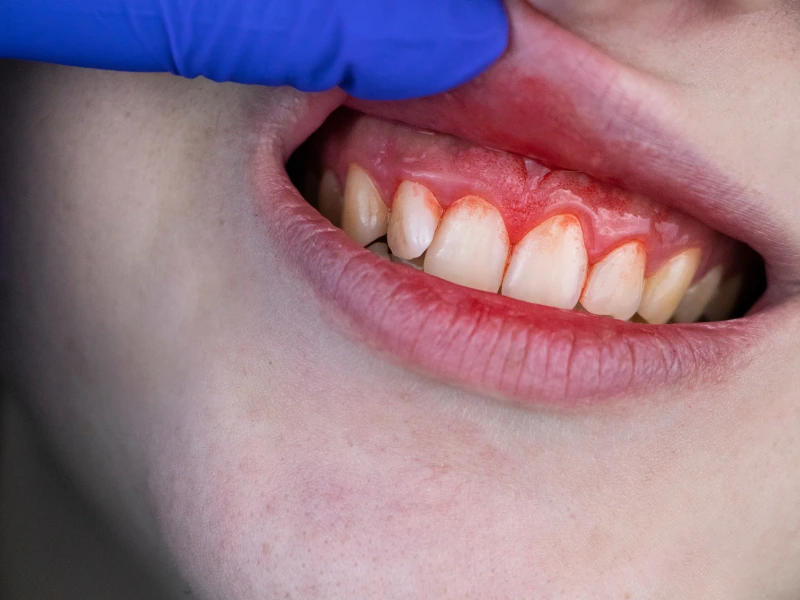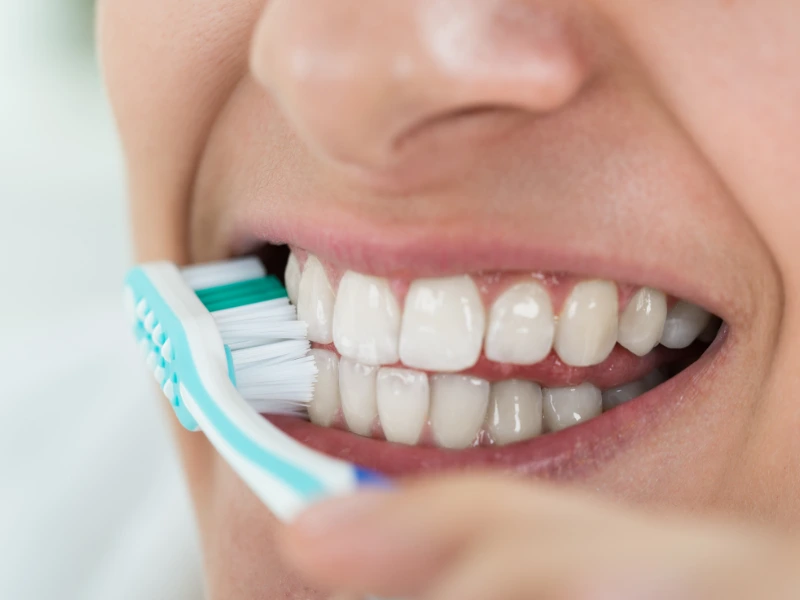
Why Are My Gums Bleeding When I Brush My Teeth?

Cavity filling costs vary based on material and location. Get an estimate tailored to your needs—book a consultation today to discuss your options!
Seeing blood on your toothbrush after brushing can be unsettling, but it’s a common issue many people face. Bleeding gums when brushing might seem minor, but it’s important to pay attention to it. Often, this happens because of brushing too hard or using a toothbrush with stiff bristles that irritate the gum tissue.
If the bleeding continues or becomes more frequent, it might indicate something more serious, like gingivitis or early gum disease. Ignoring the problem could lead to more severe issues, including tooth loss. Delaying it could make the issue worse, so addressing it sooner is crucial.
The good news is that with the right care, bleeding gums can be treated. Consulting your dentist will determine the cause and guide you on how to keep your gums healthy and free from bleeding.
Bleeding gums are often caused by the accumulation of plaque. A sticky layer of bacteria, known as plaque, develops on your gums and teeth. When plaque is not cleaned properly, it irritates the gumline, causing inflammation. This irritation can lead to gum bleeding, especially if you brush too hard. Many people mistakenly believe that brushing harder will remove plaque more effectively, but it can actually damage the gum tissue.
Gingivitis, the early stage of gum disease, is another frequent cause of gum bleeding. Gingivitis happens when plaque builds up along the gumline and causes the gums to become red, swollen, and bleed easily. If left untreated, gingivitis can progress into more serious gum disease. Early signs of gingivitis are often mild, but it’s important to address them quickly to prevent further damage.

Gum bleeding may occur occasionally, but if it continues, it might indicate a more severe problem. This could signal periodontitis, which is an advanced form of gum disease. It can result in tooth loss and affect your overall health if left untreated. Research has shown that periodontitis can even contribute to other health problems, like heart disease and diabetes. It’s important to take action early by seeking bleeding gums treatment to prevent the situation from worsening.
Along with bleeding, other symptoms might suggest a more serious condition. For example, bad breath, gum recession, and loose teeth could be signs that the problem is more severe. If you notice gums bleeding when brushing, or if these symptoms appear, it's time to see your dentist for a check-up.
Significant damage to your gums and teeth can occur by ignoring these symptoms. Early diagnosis and treatment can make a big difference in preventing further complications, including bleeding gums and bad breath.




Bleeding Gums: Blood appears while brushing or flossing.

Brush my teeth and gums bleed: Adjust technique to small, circular motions.

Floss daily: Removes plaque and food between teeth.

Vitamins: Vitamin C and Vitamin K help maintain healthy gums.

Regular visits: Dental checkups prevent plaque buildup and gum issues.

Heal naturally: Proper care and routine help heal bleeding gums naturally.
Gingivitis is the early stage of gum disease that occurs when plaque builds up along the gumline, causing inflammation. This leads to red, swollen, and irritated gums, which can bleed when brushing or cleaning your teeth. If ignored, gingivitis can progress into more serious conditions like periodontitis, causing permanent damage to the gums and teeth.
If you notice bleeding gums when cleaning teeth, it’s important to seek treatment right away. The disease can be prevented from progressing and long-term damage stopped by intervening early. With proper care, gingivitis can be reversed before it turns into a more severe problem. Regular dental checkups and maintaining good oral hygiene are key to keeping your gums healthy and preventing further issues.

Certain medications and medical conditions can make your gums more prone to bleeding. Blood thinners can reduce your blood’s ability to clot, while diabetes weakens your immune system, increasing the risk of gum disease. These conditions make it harder for your gums to heal and can cause gum bleeding.
Hormonal changes, especially during pregnancy, can also cause swollen gums and bleeding gums. This is known as pregnancy gingivitis. Increased hormones can make gums more sensitive, leading to gums bleeding when brushing. Vitamin deficiencies during pregnancy can worsen this condition, making proper care essential. In such cases, Swollen Gums Treatment can manage the symptoms and promote gum health.
Lifestyle factors like smoking, poor diet, and high stress can increase the risk of gum bleeding. Plaque buildup, caused by unhealthy habits, leads to bleeding gums while brushing and other gum issues.


A salt water rinse is a simple and effective way to heal bleeding gums naturally. By reducing bacteria in your mouth, it soothes irritated gums. Just mix a teaspoon of salt in warm water and rinse for 30 seconds. This can ease inflammation and stop gums bleeding when brushing.
Essential oils like tea tree oil can also promote gum health. It has anti-inflammatory and antibacterial properties that can reduce gum irritation and prevent gum bleeding. Massage your gums gently with a mixture of a few drops and carrier oil. This can counteract vitamin deficiencies that may be affecting your gums.
Immediate relief for gums bleeding when brushing can be provided by a cold compress. Applying a cold pack to your gums reduces inflammation and prevents further damage. It’s a quick and easy solution to manage gum discomfort.

If gum bleeding persists despites your efforts to care for them, it's time to visit Rise Dentistry. Persistent bleeding could be a sign of serious conditions like periodontitis or gum disease. Delaying professional care can lead to further damage, so it's important to act early. At Rise Dentistry, our expert team can identify the bleeding gums causes and recommend the best treatment plan to stop the bleeding and protect your gums.
To maintain optimal gum health, regular checkups at Rise Dentistry are essential. Biannual visits allow your dentist to remove plaque buildup and address gums bleeding when brushing before it becomes a more serious issue. Early intervention is key in preventing more severe gum disease. These checkups are an essential part of gum treatment and will keep your gums and teeth healthy.
If your gums bleed when brushing, it’s important to visit your dentist regularly. Typically, biannual visits are recommended. If bleeding persists, more frequent visits may be needed to monitor and treat the issue.
Occasional bleeding can occur if a hard-bristled toothbrush is used or if you brush too hard. However, if the bleeding continues, it could be a sign of gum disease and should be checked by a dentist.
Gum bleeding often occurs due to plaque buildup along the gumline. Untreated gingivitis can cause inflammation and bleeding, and brushing too aggressively may also lead to this issue.
Gingivitis is an early stage of gum disease. When plaque irritates the gums, it leads to swelling and bleeding. Gingivitis, if untreated, can advance into a more severe form of gum disease.
Yes, bleeding gums can indicate serious conditions like periodontitis, which may lead to tooth loss. They can also signal other health issues such as diabetes or heart disease.

Don’t ignore gum bleeding—addressing the issue early can prevent further damage. If you notice persistent bleeding, it’s important to seek treatment right away. Gum treatment can prevent more serious conditions and protect your overall health.
At Rise Dentistry, our team is here to keep your gums and teeth healthy. Schedule a consultation today to get the care you need and stop serious conditions from developing.

EXCELLENTTrustindex verifies that the original source of the review is Google. "For years, I avoided the dentist due to my anxiety. Dr. Hassan sorathia and their team completely changed my perspective. The office has such a calming atmosphere, and the staff is compassionate and understanding. They explained every step of my treatment and made sure I was comfortable. I'm so grateful I found them and can now take care of my teeth without fear."Posted onTrustindex verifies that the original source of the review is Google. Rise was amazing! They extracted a wisdom tooth from me and the experience was completely pain free. Thank you so much!Posted onTrustindex verifies that the original source of the review is Google. I’m so grateful I found Dr. Sorathia and his wonderful staff at Rise Dentistry! From the moment I called, his office was incredibly accommodating and got me in immediately. He was professional, kind, and patient, and he truly understood my dental anxiety. I never felt rushed or pressured and he welcomed all my questions and explained each step of the process so I always knew what was happening. He made sure I understood all of my options, allowing me to make the most informed decision for my care. I left feeling comfortable, informed, and confident about my treatment. I will absolutely be returning to Dr. Sorathia and highly recommend him to anyone looking for a compassionate and thorough dentist.Posted onTrustindex verifies that the original source of the review is Google. I’m so glad I found this office! Staff is so kind and professional. They keep your comfort at the top of their priority list. Wish I had found them sooner! Can’t recommend this dentist enough!Posted onTrustindex verifies that the original source of the review is Google. Excellent Staff and Dr Sorathia very knowledgeable pleasant ambiance !Posted onTrustindex verifies that the original source of the review is Google. Had a great experience, no wait time, in and out. Everyone was friendly, informative and professional.Posted onTrustindex verifies that the original source of the review is Google. So refreshing to meet an HONEST dentist who isn’t trying to upsell you anything. Just tells you the facts doesn’t try to sway your opinion, just lays out the options based on facts and allows you to choose for yourself what works best for you. I definitely highly recommend!Posted onTrustindex verifies that the original source of the review is Google. Fantastic service! Had a bad tooth that was absolutely killing me for several days. I load going to the dentist so I don’t have a normal one. Set the appointment in the morning and got in that same day. The dentist explained saving versus extracting the tooth and 35 minutes later I was going home. He was extremely thorough and telling me what he was going to do and with the post office instructions. The staff both out front and his assistants were fantastic!! absolutely could not have asked for a better experience and he will be my dentist going forward.
© 2023-2025 Rise Dentistry. All rights reserved.